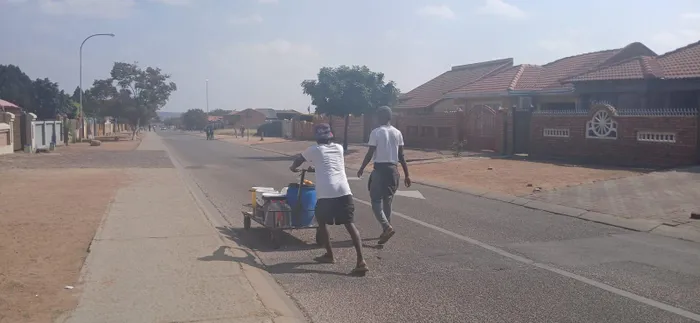
Residents resort to fetching water, pushing buckets home on trolleys due to the ongoing water shortage in their area. With the committee vowing to recall the DWS for a deeper probe into water boards, South Africa’s water catastrophe has reached a breaking point.
Image: Oupa Mokoena/Independent Newspapers
THE water crisis in South Africa is not looming — it’s already here, fueled by systemic failures, corruption, and a dangerous blame game between national and local government.
This sinking reality dominated the Standing Committee on Public Accounts (Scopa) hearing, where the Department of Water and Sanitation (DWS) faced an intense interrogation over its financial mismanagement, R25 billion in unpaid municipal debts, and the collapse of basic service delivery.
Minister Pemmy Majodina, making her debut Scopa appearance under the seventh administration, delivered a rather sobering admission: “There is no crisis in bulk water supply — but at household level, the system is collapsing.” The root cause? A staggering 105 of the country’s 144 municipalities are chronically underperforming, leaving millions without reliable water despite South Africa’s dams operating at 98% capacity.
The Minister was quick to deflect accountability, citing the constitutional division of powers. “Whenever there’s no water in a village, the DWS is blamed. But reticulation is a local government function,” she said.
Yet the data presented by her department painted a damning picture of the consequences: Municipalities owe water boards R25bn, pushing critical entities such as Amatola, Lepelle, and Vaal Central to the brink of insolvency. Meanwhile, the DWS achieved just 70% of its performance targets despite spending 99.8% of its R21.4bn budget — a disparity Deputy Minister David Mahlobo attributed to “multi-year infrastructure projects”.
Corruption remains a festering wound. Over the past five years, the Department investigated 446 misconduct allegations, with 326 substantiated. Cases have been referred to the Directorate for Priority Crime Investigation (DPCI – alias Hawks) and the SA Police Service (SAPS), but convictions remain elusive.
The SIU’s ongoing probes reveal even darker rot: R4.7bn squandered on the “War on Leaks” programme, which deployed untrained youth to fix municipal leaks — a function outside the DWS’s mandate. Another R17.9 million was paid to a consulting firm with “no evidence of work performed”, while “water tanker mafias” sabotage infrastructure to profit from emergency contracts.
The hearing turned incendiary when MK Party MP Khethukuthula Madlala confronted the DWS over its inertia. “If the government waits for formal complaints while people are being shot, we’ve failed,” he said. Minister Majodina conceded the grim reality: communities are too terrified to report extortion and vandalism, fearing violent retaliation. “We share the frustration, but our hands are tied,” she admitted, highlighting the limitations of a system that requires sworn affidavits to act against criminal networks.
The Auditor-General's findings further eroded confidence. The DWS has received three consecutive unqualified audits with “material misstatements”, while 37 procurement deviations, including a water-saving campaign that ballooned to R4.4bn, double its budget, exposed glaring financial controls. The Water Trading Entity (WTE) is owed R18bn, with debtors now taking 573 days to pay, up from 451 days last year.
The collapse of water boards emerged as a national security threat. While Rand Water and Umngeni were praised as “world-class”, entities like Amatola and Magalies are buckling under municipal debt and governance chaos. Vaal Central’s potential failure would paralyse the Free State and Northern Cape. Court battles rage as defiant municipalities — some owing billions, “take the DWS to court after receiving debt letters”.
The DA’s Peter Atkinson delivered a warning: “At R12bn a year, it will take 40 years to fix water infrastructure.” The DWS’s own estimates confirm R400bn is needed just for the worst-performing municipalities, excluding metros. While the Department touted public-private partnerships as a solution, Deputy Minister Mahlobo acknowledged a brutal truth: “Investors won’t touch bankrupt municipalities.”
The EFF’s Veronica Mente’s closing remarks cut to the heart of the crisis. “Thirty years into democracy, flushing a toilet is still a luxury,” she said, demanding that the DWS take over municipal water functions. “This isn’t just failure — it’s betrayal.”
As the hearing adjourned, Scopa Chairperson Sizwe Zibi fired a parting shot: “It’s still your problem to solve. I’m sorry.” With the committee vowing to recall the DWS for a deeper probe into water boards, South Africa’s water catastrophe has reached a breaking point — and millions are left waiting for a government that cannot, or will not, act.
Get the real story on the go: Follow the Sunday Independent on WhatsApp.
Related Topics: